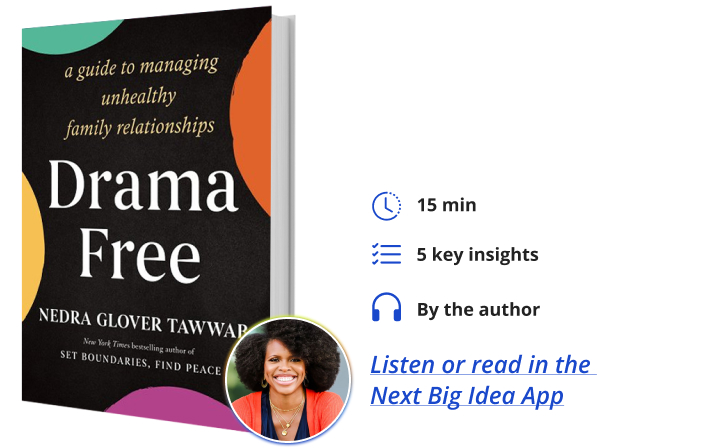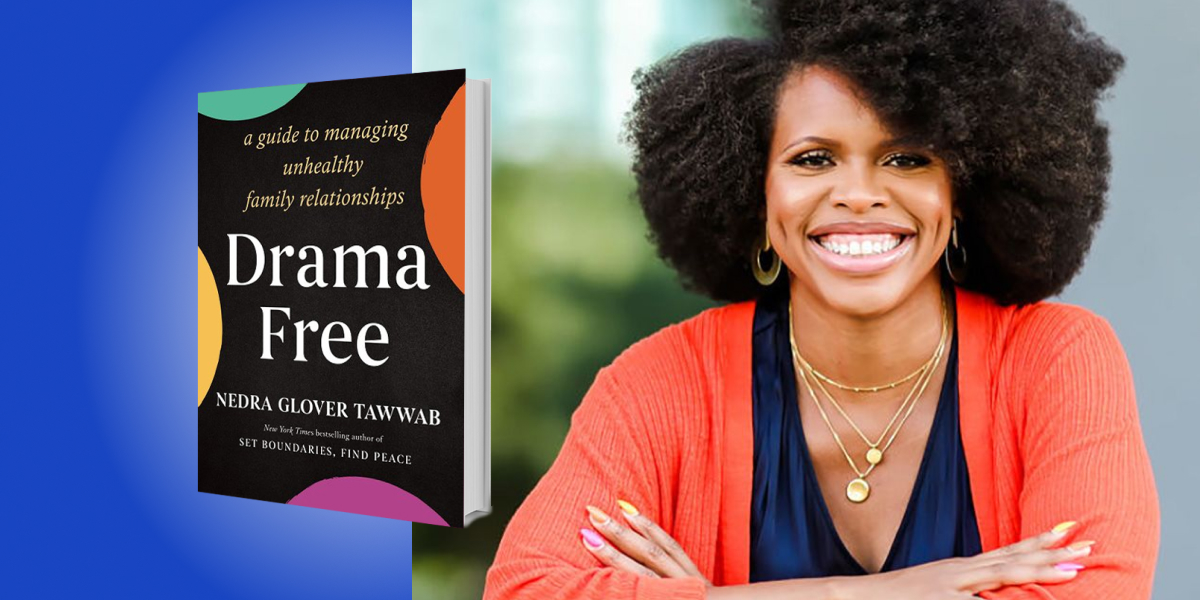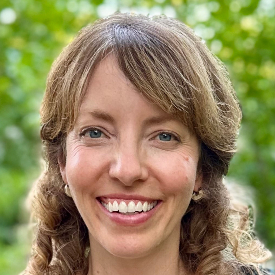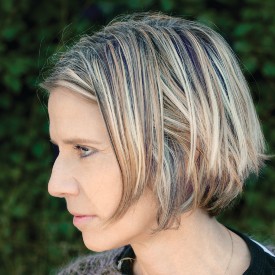Nedra Glover Tawwab is a licensed therapist, relationship expert, and New York Times bestselling author of Set Boundaries, Find Peace: A Guide to Reclaiming Yourself.
Below, Nedra shares 5 key insights from her new book, Drama Free: A Guide to Managing Unhealthy Family Relationships. Listen to the audio version—read by Nedra herself—in the Next Big Idea App.

1. People are more than one thing.
When someone has harmed you, it can be hard to see all the parts of who they are, but those backstories really matter. If you can dig deeper and determine what happened to them, or even try considering the information that you already know, you can have more compassion for the situation.
Compassion does not absolve them from any harm that they caused you, but it makes you less stressed and angry. Anger is not necessarily a bad thing, but if we sit with it for too long, it can harm our spirits. So, when we’ve been harmed by a family member, it is important to think of them as more than one thing. Yes, they may have caused harm, but there are other parts to them. What are those parts? What is their story?
2. Be the change you wish to see in your family.
The people who created the problem, the people who see nothing wrong with the way that things are currently, or the people who have no interest in changing, may not be the people to help you get past the issues in your family.
“Putting the work on the people who have the problem may not be the best fix.”
You will have to take charge and become the cycle-breaker. It doesn’t mean that you’ll always operate alone, but it does mean that you may have to start the process. Hopefully, others will join in because they see your hard work. They will understand how much you care about the relationship. But putting the work on the people who have the problem may not be the best fix. You can change a relationship through your efforts and by the things that you are willing to do for the relationship.
3. Mind reading is not a loving practice.
Unclear needs are often unmet needs. When we want something from someone, it is best for us to let them know directly. Expecting the person who created the issue to come up with a solution can often set us up for failure.
It makes sense to determine what we want in that situation with the other person. Sometimes the answer lies in the opposite of what happened, or the answer is talking it through with the other person. Once we know our needs, we should certainly give the other person the opportunity to meet those needs and be there for us. If we are withholding, it is possible that we are expecting the person to figure it out with no direction.
4. Healing is an ongoing practice that comes in many forms.
Old wounds still hurt. Sore spots are sensitive to the touch. There is no timeframe for getting over, moving on, or being through with something. Things may linger with us forever. But hopefully, at some point, we’re able to think about some things less, and maybe they will hurt less. Or at least when we think about them, we won’t become undone. But expecting things to completely go away, to have no memory of something that was once painful, is not realistic.
“We don’t need to quickly get over things or move past things.”
Perhaps we should move toward accepting the things that have stuck with us. We don’t need to quickly get over things or move past things. Some things will retain meaning. When we think about the death of a loved one, we certainly don’t want to erase the memory of them. Our work may be to live in the now with the devastation of a loss. It’s not always about moving past—sometimes it is about moving forward.
5. You can create the life you want.
When you come from a dysfunctional family, it’s often assumed that you will be like the others in that family. But there’s an opportunity for you to see the issues and change them within yourself. Sometimes there is support within that family, or you may have to go to others, perhaps mentors, therapists, friends, or other community members.
You can change. It is possible to do something different when you have the courage and when you notice a problem. The people in your family may not support those changes, but there is support from other chosen family members. You must be open to building family with friends, with support in your community, sometimes with coworkers, and sometimes with organizations that you’re a part of. You have to get clever with what “family” means to you, particularly when you have challenges within your family. Look outside of the system.
And within your family, there could be support that you’re overlooking. Are there more conversations that need to be had with supportive family members? Are there deeper conversations that could happen? Find what support is there, and you will find the courage to change.
To listen to the audio version read by author Nedra Glover Tawwab, download the Next Big Idea App today:
































